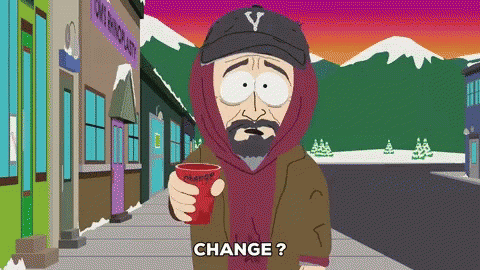- Subscribe to RSS Feed
- Mark Topic as New
- Mark Topic as Read
- Float this Topic for Current User
- Bookmark
- Subscribe
- Mute
- Printer Friendly Page
AMAA: Change with Psychologist Rashida

We all know how the saying goes - "The only constant in life is change". When I heard this in my teen years it scared the crap out of me. The thought of having to face change constantly felt so daunting. As life has moved on and I look back on all the changes I've adapted to I wouldn't have it any other way because I can't imagine who I'd be today without all the periods of transition I've come up against.
In saying this, it isn't like change is easy and I'm sure we can all agree that the mammoth changes we've all seen in the past year is enough to make anyone's head spin. So, that's why we're welcoming a brand new guest who is going to unpack this topic with us. Rashida is a psychologist and has worked with the likes of Triple J Hack, Lad Bible Australia and RUSHH Magazine ![]()
We are going to be tackling all things change - whether it's aging out of services, transitioning out of school, adjusting to covid or going through a physical change. As always, shoot your questions through and on Monday the 1st of March we will get Rashida's professional opinion on how to make the most of change.
We will be kicking off this LIVE chat from 7pm - 9pm!
Really looking forward to answering all of these great questions tonight!
Welcome @GuestPsychologist1!
So excited for this chat to start! 🙂
Hello all!!
I'm super excited to welcome Rashida @GuestPsychologist1 to the forums tonight to chat about all things Changes! It definitely feels extremely relevant after the year we have just experienced, and I'm really looking forward to this chat!

We thought this question would be a great place to kick off:
Hi Rashia, can you tell us a little about yourself and your journey to becoming a psychologist?
My journey to becoming a Registered Psychologist was a long but worthwhile one! It was a 10 year non-linear journey, with MANY changes along the way. It consisted of doing my undergrad in Australia, an exchange program for a year in Toronto Canada, coming back to Australia to complete my undergraduate degree and then struggling with my mental health due to the transition and changes from living overseas to returning to Australia.
Once I completed my undergraduate degree, I moved overseas to Kenya to work in a Non-profit organisation providing mental health counselling support to Cancer patients and their families - It was an incredible experience, however, I realised I was lacking some practical skills to be the best therapist I could be, so I returned to Australia and completed a Masters program in Counselling and Psychotherapy which was amazing.
I then started the 2 year internship component to get my official Registration as a Psychologist in Australia. The internship requires you to work in various settings so I was able to experience working in settings such as - psychiatric hospitals, private organisations, youth work organisations and now I work in private practice which I absolutely love.
I never envisioned my journey to becoming a Psychologist to go the way it did - it took me a lot longer than expected with a few (a lot) of twists and turns along the way, however, it has afforded me a variety of skills and opportunities and I am super grateful for the journey.
It sounds like you've had some amazing experiences along the way, and it's so refreshing to hear about non-linear journeys! I can imagine that you would bring so much to your role now with so many diverse experiences, and it's so refreshing to hear someone talking about all of the twists and turns along that path
Yes so many twists and turns - all really worth it now although at the time it was a pretty overwhelming feeling when a new change would occur!
That's so interesting @GuestPsychologist1. 🙂 I have a psychology degree and tried doing that 2 year internship but I didn't like the place I was interning at so I never actually finished it. It has changed a lot and now I think they are phasing it out. I'm now a mental health peer worker in an inpatient setting.
Sounds like the skills you got are serving you really well in your current role 🙂
You are right - the 4+2 pathway i did to gain my registration is being phased out in 2022 i believe, however, there are still many other pathways you can take in order to get registration.
I'll move on to the next question now, thanks so much Rashida 🙂 It was lovely to learn a bit more about you!

This question really resonated a lot with me:
What are some factors that can make going through a change easier? What are some factors that can make this harder?
Great question.
Factors that can make going through a change easier is if the change is somewhat expected or if you’ve had time to prepare for it v’s if it is a sudden change. Factors that can make going through change harder are if it has caught you off guard and been a bit of a shock.
Also the type of change you are going through will be a really important factor in determining whether it is easier or harder to go through. For example changing outfits for a night out will still cause stress and be somewhat difficult, but considerably less stress than changes from moving house!
So true @GuestPsychologist1 - I have to say that moving house is definitely up there for me as one of life's more unpleasant and stressful events!
This next question follows on from the one before, and I know I can definitely relate :

How can we cope with anxiety about change?
How can we cope with the anxiety of change - one way is to bring it back to what is within our control. At times change brings about anxiety due to the unknown - the ‘unknown’ can be a very scary place as our brain is attempting to avert risk or perceived threat all the time; The ‘unknown’ territory of change will then at times be perceived as a ‘threat’ resulting in feelings of anxiety. Therefore we want to accept the parts of the change that may be out of our control and bring it back into what’s within our control during this change, things that could be within our control are - our self-care routines during the change like practicing deep breathing and mindfulness activities, talking about it with someone you trust and know cares for you, managing the anticipation of the change, gently re-framing or challenging the change into something more positive.
@GuestPsychologist1 Something I have been trying to do lately when I've been worried about the future is writing down my fears and then coming back to it. Usually, the outcome ends up not being as bad as I was anticipating.
I also like your idea about focusing on the things we can control, especially as sometimes there is nothing we can do to change the situation.
@WheresMySquishy journaling and writing down fears is so valuable. - I often say if you’re out and about and a fear or worry comes to mind, jot it down in your phone notes!
Coming back to it when you’re less anxious will also be so much more helpful as you will have a better ability to review it and check in about whether your anxiety is in proportion to the change or thing you’re fearing.
@GuestPsychologist1 that's so true, the unknown can indeed be a very scary place, and I feel like it really gets the lizard parts of my brain going- straight into those primal emotions and reactions! Accepting the parts of things that are out of our control and bringing it back to what's in our control is such a great way to frame that.
This question follows on nicely from that one:
How do you accept bad news?
How to accept bad news - Accepting that acceptance or receiving of bad news will most probably also result in the surfacing of some difficult emotions like anxiety, sadness, grief, or anger - these are all emotions which we usually attempt to avoid however they are vital in the process of getting through and accepting the bad news or change. They are part of our human condition and human emotional experience. Sit with them and know they are valid and there for a reason, it’s so normal to find it difficult to accept bad news.
@GuestPsychologist1 that's so true, it's only as I've gotten older that I've realised how much I would try and avoid difficult or uncomfortable emotions, and I think it is so incredibly important to realise that sometimes we do need to sit with those- like you say, it's a part of the human condition ![]()
I feel like the next question relates quite a bit to the last 2 questions, it comes from someone from our Instagram community:

What if I can't cope with change?
I guess this is determined more by what you consider ‘can’t’ to look or feel like - Is it that it brings about too much overwhelming emotion that feels all consuming and that then makes you feel like you can’t get through it or is it something else.
I believe we can all get through change with the right support around us, but the way in which we get through it may look different from person to person, again back to my previous answer - remembering there is no ‘right or wrong’ way, but more so adaptive and maladaptive ways to get through our changes.
Love that approach @GuestPsychologist1 - the right support can truly make the world of difference, and sometimes it can be really easy to beat ourselves up if we feel like we're not coping with things the "right" way.
I thought this next question was really interesting one:
How can I better cope with being over sensitive both in general and coping when I get criticisms even if it is constructive?
So knowing that - Coping with criticism can be really difficult -
I think it is important to reflect on a couple of things.
Who is providing the criticism and what is their place in your life - are they attempting to better support you v’s what we can imagine to feel like making things more difficult for you.
Has their criticism touched on something you value about yourself or does their criticism not match with your experience of who you know yourself to be and is that maybe why it is causing a sensitivity
Super interesting question.
I guess to pre-face this question i would provide some context around the fact that we as human beings are hard-wired with a ‘negativity bias’ which is there to help keep us safe from ‘risk’, however, can at times flood into everyday life when we don’t really need to be protected from any risk - including when we are getting criticism/ or feedback.
It basically means we spend a lot more time focusing and then ruminating on what we perceive as negative - news/ information or criticism. The fact we spend more time focusing on it, means it has more of a chance to commit to our memory and then all the positive feedback/ or constructive criticism we get basically doesn’t stand a chance.
E.g - If you are to receive some ‘negative’ feedback from your manager on Monday, and the remainder of the week is neutral or positive - you will still be thinking about the feedback from Monday and find it difficult to take into account the rest of the week and feedback you received.
@GuestPsychologist1 I find it super interesting to think about the hard wired tendencies that we have that may have been protective, or may be protective in some circumstances, but can end up being really unhelpful at times!
This next question does relate a bit to the last one and I'm really interested to hear the answer to this one!

Hi Rashida! In the past I have had negative changes that have impacted a huge part of my life but now I seem to view ALL change, even good, as stressful and scary. Do you have any advice or strategies that can be used to reframe this negative mindset into a positive one? Thank you 😄
It sounds like you have great awareness regarding why some of these new changes are eliciting a reaction of stress or fear - due to the changes you have gone through in the past - which is a great start to gently challenging whether these new or upcoming changes are requiring the same level of fear. We have a saying ‘neurons that fire together, wire together’ - meaning, the more often we feel something the more likely we automatically feel that and can start believing it. Remember feelings don’t always equal facts. Although you might be feeling like the change is scary and stressful doesn’t mean it actually is.
If you have some awareness that even positive changes are eliciting this automatic response of fear and stress - it may be helpful to write down all the evidence to show that it doesn’t require that emotional response and the reasons why it is a more positive change. Then repeating this to re-affirm it each time the stress or fear surfaces.



